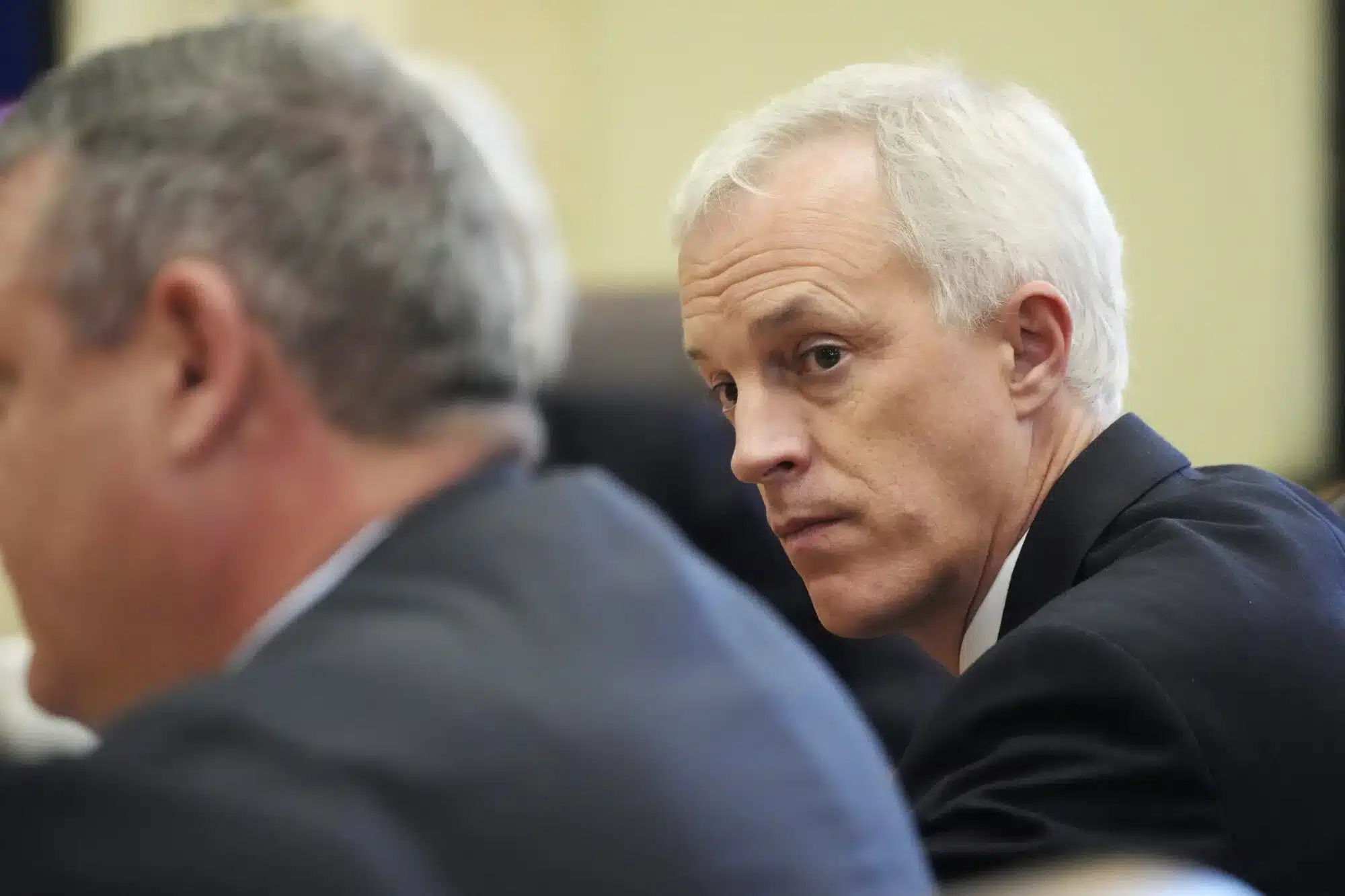This article first appeared on the Magnolia Tribune.


Mississippi Senate Education Committee Vice Chairman Sen. David Blount, D-Jackson, March 5, 2024, at the state Capitol in Jackson, Miss. (AP Photo/Rogelio V. Solis)
- A bill intended to limit the state’s financial liability in the event an employer were to withdraw from the state’s retirement system passed the Mississippi Senate this week.
Lawmakers in the Mississippi Senate passed a bill that would hold employers responsible for any unfunded actuarial liability should they chose to withdraw from the state’s retirement system.
The Public Employee Retirement System (PERS) is the state’s retirement plan for individuals who have worked jobs that span across city, county, state, and school districts in Mississippi.
The bill, SB 2904, authored by State Senator David Blount (D), says any entity whose plan is terminated through legislation, privatization, sale, dissolution, or any other method shall pay to its portion of the unfunded actuarial accrued liability in a lump sum to the PERS Board before termination.
Senator Blount said this is a very uncommon occurrence, but one lawmakers felt needed to be addressed since conversations are ongoing as to the financial future of PERS. He reiterated that this would not change any benefits to current or future employees participating in PERS.
PERS is a pre-paid system. However, the liability in question relates to what is paid to an employee upon their retirement. This legislation is intended to protect the state from “carrying the bag” in the event an employer leaves the plan and is no longer paying their portion into the system.
“If you are an employer and you’re in PERS and you are sold or privatized and your employees are no longer in the PERS system, when you terminate that relationship with PERS, or the day before, you have your share of unfunded liability in the entire system and you need to pay that share before you disengage with PERS,” said Senator Blount.
Some lawmakers questioned how this liability number was to be calculated.
State Senator Daniel Sparks (R), who expressed support for the bill, questioned how the liability amount would be defined. Upon making an amendment to add a reverse repealer to the bill, Sparks asked whether or not this liability number would reflect a snapshot of what the employer owes for all retirees living or what is owed at the time. Senator Blount said current accounting requirements allow for these to be calculated and on file with employers and PERS.
The PERS Board recently made a recommendation to raise the employer contribution rate 10% over the next several years in order to support the system’s members and meet its financial obligations. Senator Sparks said that decision could have huge ramifications on cities and counties that have expressed concern that they will not be able to financially afford the increased rate. He said it could cause them to also exit the plan.
“Let’s be honest folks, we’re all in this together. This is a state retirement system. We’re all in this together – every city, every county, every school in the state. And the state should not be left holding the bag if someone leaves the system,” said Sparks.
The reverse repealer was adopted by the chamber.
State Senator Hob Bryan (D) took issue with statements made against the PERS Board and their recent recommendation of the rate increase, saying they are only operating within the laws that the Legislature has passed while considering what is in the best interest of their members.
“It seems to me, whether directly or indirectly, we want to grumble about the board,” said Senator Bryan. “To me, that’s not the problem.”
RELATED: Sustainability of state’s retirement plan hangs in the balance as changes are considered
Concerns regarding the state’s plan began to resurface in 2022 when the PERS Board voted to increase the employer contribution rate. The increase was halted after an agreement was made with the Legislature to kill a bill that would have removed that decision making power from the Board and give it to lawmakers.
In September of 2023, Executive Director Ray Higgins told the Joint Legislative Budget Committee (JLBC) that the PERS Board would be recommending a yearly 2 percent employer rate increase, until a full 10 percent increase was implemented. This would begin in July of 2024.
Lawmakers present at the meeting last Fall, including former Speaker of the House Philip Gunn, expressed extreme disapproval in this move, saying it would detrimentally impact cities and counties.
“Does your Board understand that they’re basically calling for a tax increase on citizens?” asked Gunn at the Fall meeting. “Do they understand that their purpose will either cut services or raise millage? And your board is comfortable asking for one of those two measures to be done.”
The former Speaker along with others noted that such changes could give cities only two options – lay off employees and reduce services or increase taxes on citizens.
Lawmakers in this 2024 session continue to work with the PERS Board on other legislative requests in order to keep the program whole and financial solvent.
This article first appeared on the Magnolia Tribune and is republished here under a Creative Commons license.
Read original article by clicking here.

